 Mälestused-Jutustused
Mälestused-JutustusedВоспоминания/Рассказы
Memoirs/Stories
 Mälestused-Jutustused
Mälestused-Jutustused
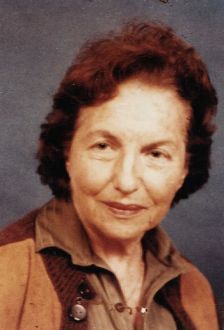
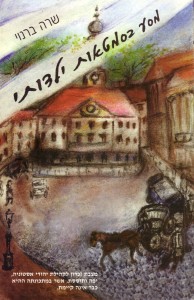
Sara Barnoy (Epstein)
… As I already described to you how everyone in the family was engaged in social activities in the evenings, so I had to stay with the Russian maid in the warm kitchen, and we had a good time. I could sing with her and she never said (as Rachel did): “stop screaming” when I was sure I was singing. She told me about her boyfriends from the village and sang Russian songs, and I joined her. I remember one song, when the girl found out that her lover betrayed her and she poisoned herself to death. I cried bitterly out of compassion. But I never sang the song in the salon, I felt that it didn’t fit there – it was a “kitchen-song”… I was a good listener.
At that time they started organizing the trade-unions particularly the union of the domestic help. One evening our maid told mother that she wanted to go to a meeting of her union, and if she could be excused for that evening. Of course mother gave her consent. When she returned she looked excited and was red in the face. Mother asked: “What did you decide at the meeting?” “We decided that we must fight for our rights. First thing, a day’s work is 8 hours only” “Fine. So which hours do you choose?” The answer was: “What do you mean? From 8 in the morning till 8 in the evening, not a second longer…”
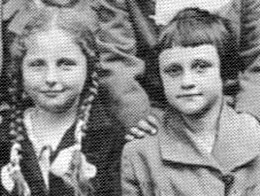 We all had many friends. My best girlfriend was Shulamit Payenson, her father was a dentist. For many years Shulamit was an only child. One day she came to school very agitated (it was, I guess, in the first or second grade of the elementary school). She told me that her mother was expecting the stork, who was due to come when we finish school. So we’ll have to hurry home. I agreed, and envied her that she would see the stork from close quarters… Instead of walking slowly home, we had to slide on the ice along the sidewalk. Next day she informed me: I have a baby-sister! This didn’t interest me in particular. What I wanted to know was if she had actually seen the stork. “No, he was in a hurry, he had still a few babies to deliver”.
- “Couldn’t your mother ask him to wait for you?”
“Impossible!” was the answer. But deep in my heart I knew that mother would have persuaded him to wait, because in my eyes mother was expert to accomplish the impossible!
We all had many friends. My best girlfriend was Shulamit Payenson, her father was a dentist. For many years Shulamit was an only child. One day she came to school very agitated (it was, I guess, in the first or second grade of the elementary school). She told me that her mother was expecting the stork, who was due to come when we finish school. So we’ll have to hurry home. I agreed, and envied her that she would see the stork from close quarters… Instead of walking slowly home, we had to slide on the ice along the sidewalk. Next day she informed me: I have a baby-sister! This didn’t interest me in particular. What I wanted to know was if she had actually seen the stork. “No, he was in a hurry, he had still a few babies to deliver”.
- “Couldn’t your mother ask him to wait for you?”
“Impossible!” was the answer. But deep in my heart I knew that mother would have persuaded him to wait, because in my eyes mother was expert to accomplish the impossible!
In summer we used to go to Elva. It was planted right in the middle of a charming legendary surrounding, where fairy tales were born. Woods with every kind of berries, mushrooms, hid indescribable beautiful lakes. There was the background music of birds, cuckoos above, and a mysterious qua-qua of a frog, or was it bewitched prince from the stories of Grim or Andersen? The sun had to force its way from among the tall summits of the trees and send shiny ways like regards from heaven.
Barbara, Rachel and Liuba were very happy there, because they were surrounded by numerous friends from school. In the mornings they went swimming in the big lake. There was only one serious problem: how to get rid of the unnecessary part around the waistline…
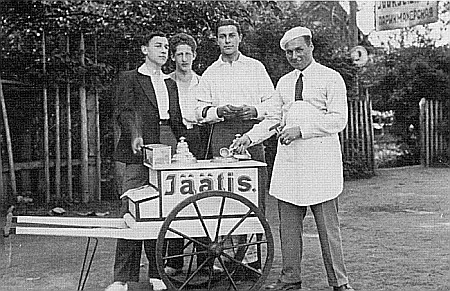 All three of them used to go jogging around the shadowed highway. It was rather tiring: the first (the fattest) was Liuba to express her urgent need for a bench. The second one was Barbara. Rachel was the fittest. She never felt tired; she knew how to control herself. In the afternoon they had their “rendezvous”.
All three of them used to go jogging around the shadowed highway. It was rather tiring: the first (the fattest) was Liuba to express her urgent need for a bench. The second one was Barbara. Rachel was the fittest. She never felt tired; she knew how to control herself. In the afternoon they had their “rendezvous”.
Look at the photo of an ice-cream cart. One of the Jewish boys from the German Gymnasium borrowed the white cap and apron and overtook the job of the ice-cream man. They gathered all around and had a wonderful time. Very modest “dolce vita”, nevertheless very enjoyable.
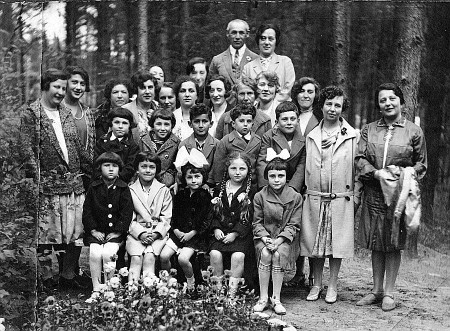 There were wealthy families that kept nice houses for the summer season. I remember a birthday party to which I was invited. The boy had a permanent German governess, like many others. I am looking at the picture and it all comes back to me like alive.
First the birthday table with good cakes and surprises. Hand-embroidered tablecloths. The governess took good care of us. The mothers had a good time at another table, chatting. Later the governess was in charge of the games. At the end the photographer appeared with his equipment. You know: the stand on very thin feet with the mysterious black box where he hid his head… When he re-appeared he told us to smile but not to breathe! Complicated, but worthwhile. The picture testifies that it all happened in reality and is not my imagination.
There were wealthy families that kept nice houses for the summer season. I remember a birthday party to which I was invited. The boy had a permanent German governess, like many others. I am looking at the picture and it all comes back to me like alive.
First the birthday table with good cakes and surprises. Hand-embroidered tablecloths. The governess took good care of us. The mothers had a good time at another table, chatting. Later the governess was in charge of the games. At the end the photographer appeared with his equipment. You know: the stand on very thin feet with the mysterious black box where he hid his head… When he re-appeared he told us to smile but not to breathe! Complicated, but worthwhile. The picture testifies that it all happened in reality and is not my imagination.
In Estonian it was called Narva-Jõesuu, which in terms of the country and the time, was an elegant summer resort. In time of the Tsar the Russian nobility used to spend the summer there, together with rich Europeans. It is quite near the Russian border and lied at the coast of the Finnish gulf, near Narva (hence the Estonian name Narva-Jõesuu).
As I mentioned before, we used to go for a summer vacation to Elva, which was just countryside, in the lap of nature. But when father lost his job, mother rented a hotel, together with a partner, and opened a kosher boarding house. It was hard work and everybody helped, but it gave us a decent living.
I remember there was a lonely lady (her husband came only for weekends) who used to take daily walks and used to ask me to accompany her. When we came across the ice-cream cart I remember once I asked her: “Do you like ice-cream? I just love it…” She obviously did, because thereafter we had ice cream for her and for me.
……..
On one bright day mother announced that she got a good offer to overtake the buffet, including lunches, in the Jewish Club in Tallinn. This meant that we had to move to Tallinn: to leave the big apartment of 5 rooms, maid’s room, kitchen, corridor and storeroom, and move to one single room that was attached to the buffet. We were only three: father, mother and myself, 9.5 years of age. David was serving in the Estonian army, and Rachel was preparing to go to Israel. At this particular time she was living in a village with an Estonian family of farmers, to learn something about agriculture – as the requirements of the Hachshara – preparations to make “Aliah”.
I remember moving as a real nightmare. We had to hurry because we had only a couple of weeks before mother had to open the Club. The piano was the first to leave home. Mother had no time to try to sell it (and who, for Heaven’s sake, sells a piano, which is a dear member of the family?), so she gave it away to a family to safeguard it and inform us what she did.: we never ever saw the piano or heard of it. The furniture was sold to a family, who took it complete, including the kitchen, because all these we were supposed to get in our new whereabouts in Tallinn. Besides it was only a temporary arrangement, as we were actually heading for Palestine. With such plans any luggage was just a pain in the neck. The last thing was to vacate the library. We had valuable books, and parting with them was very painful. But we were under pressure of time and had neither time nor possibility for calculations. I remember the beautiful dark-red velvet bindings and the golden lining of each page of Pushkin’s works in 3-4 volumes, many other classical Russian writers – as three of our siblings studied in Russian Gymnasium. German classics – naturally: which cultured Jewish family didn’t have the works of Goethe or Heinrich Heine?! and Jewish literature – mostly classical, because David was in the Jewish Gymnasium.
.....
Father booked three workers to come and pack the books in big wooden boxes. They had dirty hands, grasped brutally the delicate bindings and squeezed them with their rough hands into the boxes. It really hurt me, so I asked the workmen meately to handle the books more carefully. The foreman came and told me not to disturb their work. I was very sad. I saw in their attitude the destruction of the cultural world I wanted to be part of. This nightmare haunted me at night in my dreams. It was as if I envisaged... what Hitler did much later.
Finally we arrived in Tallinn. The Jewish club was located on the main street, Narva maantee. It was a very wide street and the street car passed there, exactly opposite the club. The entrance was large and elegant. The stairs that led to the building, divided the building into two wings, one of which was the Jewish club. It was the center of Jewish cultural life in town. It was kept very well. There was mother’s buffer and her “kosher” Restaurant with good kosher food, as only mother knew to prepare. The restaurant was rather big and had quite a number of small tables for four or more persons. From there, passing a corridor, you entered the library and reading room. The librarian was a nice man and very polite. In the library they used to have lectures. Then was the big hall with a grand piano for special occasions like concerts or parties and even balls. Attached were the wardrobe, and a bathroom for the public, that attended the place. At the other end of the corridor were two rooms for our personal use: a smaller wardrobe and bathroom with a tub – in ridiculous proportion to our tiny living room that served the family: father, mother and myself. It contained a cupboard, 2 beds for my parents at the two sides of the room, and a folding bed for me (that didn’t permit me to grow…) My homework for school I used to prepare in the room of the buffet, when it was closed till 4 o’clock, when there were no customers. The harder the conditions were, the more efforts I made to succeed in my studies at school. My diploma from the elementary school and the two further classes in Estonia testify that my efforts were not in vain: “Väga hea” is the Estonian for very good – the highest grade.
……
My best friend in Tallinn was Golda: a nice, intelligent and diligent girl. We were together both in school as in the youth organisation “Beitar”. There we met, in the afternoons, with boys that were a year or two older than we. When Yanzi Gleser became interested in me, Kubrik was forgotten. I became more attached to “Beitar” and active, and went there more than just once a week. Rythmics and piano lessons had to be left – mother couldn’t afford it. I learned to do my homework quicker. I suppose this is what most of us did.
The popular entertainment in those years was movies. I knew all the songs from “Ufa” films (in German) by heart. It was easy: the tickets were rather cheap and the seats were not marked. So we could see the movie twice without extra pay. Martha Eggert, Willy Tritsch, Willy Forst, Yan Kieppura, Joseph Schmidt and many others. The American movies with Al Johnson, Lilian Harvey, Greta Garbo and many others, in particular it was fashionable to collect pictures of movie stars. When I left for Palestine my girlfriends gave me as a present a thick copybook with photos of movie stars, and each of them held sweet memories of those days – the atmosphere, the friendships – in short: a piece of my life which I left behind. The movies were concentrated near the main street. I remember the narrow street adjacent to the main street. The nicest was “Bi-Ba-Bo”. Above the entrance was the sign that was lighted by coloured lamps, on black background, changing their colours while lighted. The contrast between them and the dimly lighted entrance awoke in us illusions and promised to show us another world, legendary and charming.
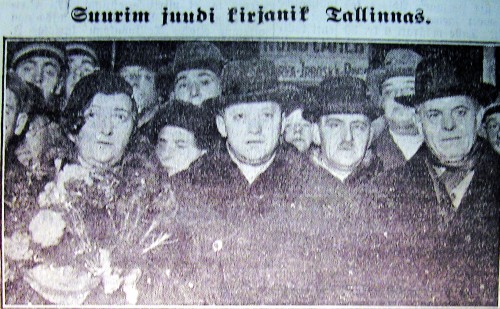
Mr Gurin, our headmaster, was not a Zionist – so they said. When our family moved to Tallinn, one of the first things I was told was: about six months before my arrival Chaim Nachman Bialik visited Tallinn. As I already mentioned before, Estonia was quite far from Jewish life in Europe – you could say a province. Important Jewish personalities visited us rather seldom. When Bialik came to Tallinn, he was welcomed as befitted the poet laureate of the Jewish nation. He came to our school to have a speech in front of all the pupils. He explained the importance of the Hebrew language to the national awaking of our people – Zionism. The speech was very persuasive and all pupils became very enthusiastic and accepted his call to fight for the Hebrew language. He asked them to demand to increase the number of Hebrew lessons on account of Yiddish lessons.
When the photographer arrived to take pictures of the whole school with Bialik – the headmaster Mr Gurin refused to participate. He was furious at Bialik for having said what he did – like starting a “rebellion” against Gurin behind his back. Obviously behind the closed door of the teachers room a real drama took place. They raised their voices at each other (so they say) and during their loud dispute Bialik slapped Gurin in the face. He then cancelled the public meeting in one of the greatest halls in Tallinn, where he was supposed to address the Jewish audience, and left immediately for Riga.
The story was naturally published in the daily press in and outside Estonia, being the kind of news that travel fast as the participating characters being such well-known personalities. On the other hand: may be it was a natural reaction for one who was very offended by Bialik. We will grant him the benefit of doubt and add no other reasons. On the other hand it may serve as a linking explanation for what happened to his daughter Eugenia Gurin-Looov, who apparently was an active member of the Estonian communist party. She is the author of the book “Holocaust of the Estonian Jewry”.
With the development of Zionism started the awakening of the Hebrew language. In Tartu Yiddish was the language in which we studied. I remember our Yiddish teacher Mr Levenberg, who was against Zionism and fought for integration of the Jewish communities in the population of the countries in which Jews lived, but also against total assimilation. This theory said that we must fight for equal rights in the countries of the diaspora and Yiddish is the most important link among the Jewish nation that is spread all over the world. He didn’t consider Yiddish a “jargon”, but a normal language, which should be treated with full respect. We studied Yiddish grammar and used a book "די גראמאטיק פון יידישער שפראך", by Reisin. We studied Yiddish literature, which is a real treasure, this is common knowledge. Whereas the Jewish school in Tallinn was Zionist-minded and turned to Hebrew. This was the beginning of the Zionist era in the Balticum, with youth movements accordingly. We left the Estonian scout organistaion and joined the Jewish youth organistaion: Beitar with all those beautiful slogans which we tried hard to materialise, and Hashomer Hazair which tended to socialism.
The most beatuful years for me, and I am sure for every youngster who belonged to a youth organisation – for this matter any youth organisation. I personally belonged to Beitar. I cherished the series of moral values, which was named in literal translation “the glory of Beitar”.The dream was to live up to those beautful, noble values such as truth, loyalty, integrity, respect towards your follow-men, and self respect that combined all these values. They weren’t just abstract terms. I learned in Yiddish to be loyal to Hebrew. I expressed myself in Yiddish to declare my loyalty to Hebrew... We learned to believe that your fellow man is a part of your own self. These terms, when you are young you accept them as a moral codex: they were so real, almost tangible. Where are they now when we need them so badly to build a better life! They seem to have simply vanished. I know there are a million good reasons to go back for a short while to their young years and that naive atmosphere. I am sure they can find a better erasoning, which will lead to a better solution. It won’t be childish – it will be straight to the point of the problem because there won;t be pressure or compulsion of any kind influenced by other interests, that have no connection to the problem under discussion.
Back to the Yiddish language: when started the awaking of Hebrew, Yiddish was dangerous because it was easier and Hebrew would be neglected. Now Hebrew is of a firm position, so we can and should indulge in using from time to time the Yiddish language. Ut has much charm and has so many rich ways of expression because it lead our nation from hell to life and preserved our sanity.
As for me personally Yiddish is a part of the nostalgia or the young years that are gone and will never return. So let us, at least, cherish it as a dear memory and with respect and due evaluation, and never lose it.